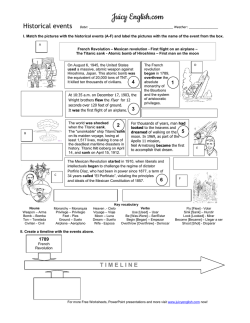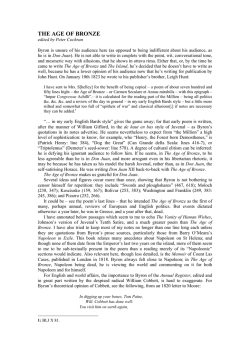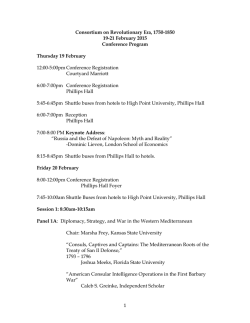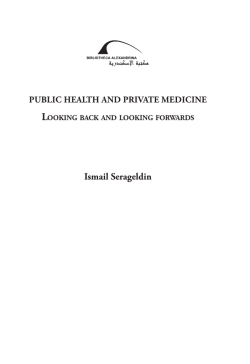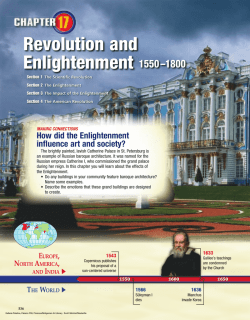
documento 480991
Name CHAPTER 18 S 1 ECTION Class Date Note Taking Study Guide ON THE EVE OF REVOLUTION Third Estate ready to revolt Soaring national debt Inequalities among classes Causes of the French Revolution Focus Question: What led to the storming of the Bastille, and therefore, to the start of the French Revolution? As you read this section in your textbook, complete the following chart by identifying the multiple causes of the French Revolution. Some items have been completed for you. © Pearson Education, Inc., publishing as Pearson Prentice Hall. All rights reserved. 164 Name CHAPTER 18 S 1 ECTION Class Date Section Summary ON THE EVE OF REVOLUTION Under France’s ancien régime, there were three social classes, or estates. The clergy made up the First Estate. The nobles made up the Second Estate. Everyone else, including the bourgeoisie, or middle class, belonged to the Third Estate. Most of the Third Estate was made up of rural peasants. Its poorest members were urban workers. Members of the Third Estate resented the privileges enjoyed by the other classes. The First and Second Estates, for example, paid almost no taxes. Yet peasants paid taxes on many things. People began to question this inequality. Economic troubles added to France’s social problems. France was deeply in debt because of deficit spending. Bad harvests sent food prices soaring. Louis XVI chose Jacques Necker as his financial advisor. Necker proposed taxing the First and Second Estates, but the nobles and high clergy forced the king to dismiss him. As 1788 ended, France was nearly bankrupt. Louis XVI called for the Estates-General to meet at Versailles. The Estates-General was the lawmaking body made up of the three classes. Before the meeting, the king had all three estates prepare cahiers, or notebooks, listing their complaints. The long lists of problems showed how deeply the Third Estate resented the other two estates. The Estates-General met in May 1789. Delegates of the Third Estate took a daring step. They claimed to represent the people of France and formed a new National Assembly. Locked out of their meeting place, the delegates took their famous Tennis Court Oath. They swore never to separate until they had established a just constitution. On July 14, 1789, the streets of Paris buzzed with rumors that royal troops were going to occupy the city. A crowd gathered outside the Bastille, a grim fortress used as a prison. They demanded weapons that were stored there. When the commander refused, the angry mob stormed the Bastille, sparking the French Revolution. Review Questions 1. What were the three classes during France’s ancien régime? 2. Why was France in debt? © Pearson Education, Inc., publishing as Pearson Prentice Hall. All rights reserved. 165 READING CHECK Which social classes paid the least in taxes? VOCABULARY STRATEGY Find the word urban in the underlined sentence. Notice that the word rural appears in the previous sentence. Rural means “country.” Rural is an antonym of urban, so it has the opposite meaning. Use what you know about the word rural to help you figure out what urban means. READING SKILL Recognize Multiple Causes List two causes of the French Revolution. Name Class CHAPTER 18 S 2 ECTION Date Note Taking Study Guide THE FRENCH REVOLUTION UNFOLDS Focus Question: What political and social reforms did the National Assembly institute in the first stage of the French Revolution? As you read this section in your textbook, complete the following outline by identifying the main ideas and supporting details in this section. Some items have been completed for you. I. Political crisis leads to revolt A. The Great Fear 1. Inflamed by famine and rumors 2. B. Paris Commune comes to power. 1. 2. II. The National Assembly acts A. Special privilege ends. 1. 2. B. Declaration of the Rights of Man 1. 2. C. 1. 2. III. The National Assembly presses onward A. The Church is placed under state control. 1. 2. B. 1. 2. C. 1. 2. (Outline continues on the next page.) © Pearson Education, Inc., publishing as Pearson Prentice Hall. All rights reserved. 166 Name Class CHAPTER 18 S 2 ECTION Note Taking Study Guide THE FRENCH REVOLUTION UNFOLDS (Continued from page 166) IV. A. 1. 2. B. 1. 2. C. 1. 2. D. 1. 2. © Pearson Education, Inc., publishing as Pearson Prentice Hall. All rights reserved. 167 Date Name Class CHAPTER 18 S 2 ECTION READING CHECK What kind of government did the sans-culottes want? VOCABULARY STRATEGY Find the word proclaimed in the underlined sentence. What do you think it means? The words proclamation, declaration, and announcement are all synonyms of proclaimed. They are words with similar meanings. Use what you know about these synonyms to figure out the meaning of proclaimed. READING SKILL Identify Supporting Details Identify two Enlightenment goals that are found in the Constitution of 1791. Date Section Summary THE FRENCH REVOLUTION UNFOLDS In France, the political crisis of 1789 happened at the same time as a famine. Starving peasants took out their anger on the nobles. Many factions, or dissenting groups of people, struggled for power. Moderates looked to the Marquis de Lafayette for leadership. However, a more radical group, the Paris Commune, took over the city’s government. The storming of the Bastille and the peasant revolts forced the National Assembly to act. Nobles gave up their privileges. In late August, the Assembly issued the Declaration of the Rights of Man and the Citizen. It proclaimed that all male citizens were equal. However, it did not grant equal rights to women. Journalist Olympe de Gouges wrote a declaration that did, but the Assembly did not accept it. In the meantime, the king hesitated to accept reforms. His queen, Marie Antoinette, angered many for spending money while people starved. Thousands of women marched to Versailles, where the royal family lived. They demanded the king return to Paris. The National Assembly soon drafted the Constitution of 1791. It reflected Enlightenment goals, stating that all male citizens were equal under the law, and placing the Church under state control. Events in France caused debate all over Europe. Some praised the reforms. European rulers, however, feared the French Revolution. They worried that the rebellion would spread. The horror stories told by French émigrés who fled the revolution added to the fear. In October 1791, the newly elected Legislative Assembly took power. However, it did little to improve conditions. Working-class men and women called sans-culottes pushed for more radical action. Some demanded a republic. The Jacobins, a revolutionary political club, supported the sans-culottes. The radicals soon controlled the Legislative Assembly. They were eager to spread the revolution and declared war against Austria and other European monarchies. Review Questions 1. Who was Olympe de Gouges? 2. Why did European rulers fear the French Revolution? © Pearson Education, Inc., publishing as Pearson Prentice Hall. All rights reserved. 168 Name CHAPTER 18 S 3 ECTION Class Date Note Taking Study Guide RADICAL DAYS OF THE REVOLUTION Focus Question: What events occurred during the radical phase of the French Revolution? Jan. 1793 Aug. 1792 Sept. 1792 Louis XVI is executed. Mob invades royal palace. National Convention abolishes the monarchy and establishes the French Republic. September massacres take place. Sept. 1793 July 1794 1795 As you read this section in your textbook, complete the following timeline to show the sequence of events that took place during the radical phase of the French Revolution. Some dates have been completed for you. © Pearson Education, Inc., publishing as Pearson Prentice Hall. All rights reserved. 169 Name Class CHAPTER 18 S 3 ECTION READING CHECK Who helped to create the Reign of Terror? VOCABULARY STRATEGY Find the word radical in the underlined sentence. Notice that the word more appears before radical. Read the sentence aloud, skipping the word radical. Then ask yourself, “The Convention was more what than earlier assemblies?” Use the word more and your prior knowledge to figure out what radical means. Check your definition in a dictionary. READING SKILL Recognize Sequence What happened before radicals called for the National Convention to be established? Date Section Summary RADICAL DAYS OF THE REVOLUTION In 1793, the revolution entered a dangerous and bloody phase. Tensions rose between revolutionaries and those hoping to restore the king’s power. On August 10, 1792, a mob stormed the royal palace. Radicals called for the election of a new legislature called the National Convention. Suffrage, or the right to vote, was given to all male citizens, not just property owners. The Convention that met in September 1792 was more radical than earlier assemblies. It voted to end the monarchy and establish the French Republic. Louis XVI and most of his family were put on trial and beheaded. Counter-rebellions inside France worried the Convention. To deal with these, they created the Committee of Public Safety. Maximilien Robespierre led the Committee. He helped to create the Reign of Terror. The Terror lasted from September 1793 to July 1794. During that time, courts held trials for those who resisted the revolution. Many were falsely accused. About 17,000 people were beheaded by guillotine, including Robespierre. With Robespierre’s death, the revolution entered a lessextreme stage. Moderates wrote the Constitution of 1795. It set up a Directory of five men to lead the nation, and a two-house legislature. However, rising prices and corruption remained. To prevent chaos politicians then turned to military hero Napoleon Bonaparte. The French Revolution greatly changed France. The old social order was gone. The monarchy was gone. The Church was under state control. Nationalism, or strong feelings of pride and love for one’s country, had spread throughout France. From the city of Marseilles, troops marched to a new song that later became the French national anthem. Revolutionaries also made social reforms. They set up systems to help the poor. They also ended slavery in some French colonies. Review Questions 1. What did the New National Convention do in 1792? 2. Identify one major change that the French Revolution brought to France. © Pearson Education, Inc., publishing as Pearson Prentice Hall. All rights reserved. 170 Name Class CHAPTER 18 S 4 ECTION Date Note Taking Study Guide THE AGE OF NAPOLEON Focus Question: Explain Napoleon’s rise to power in Europe, his subsequent defeat, and how the outcome still affects Europe today. As you read this section in your textbook, complete the flowchart to list the main ideas about Napoleon’s rise to power and his defeat. Some items have been completed for you. Napoleon quickly advances through military ranks. In 1802, Napoleon names himself consul for life. In 1804, Napoleon assumes the title of Emperor of the French. © Pearson Education, Inc., publishing as Pearson Prentice Hall. All rights reserved. 171 Name Class CHAPTER 18 S 4 ECTION READING CHECK What was one of Napoleon’s most lasting reforms? VOCABULARY STRATEGY Find the word anticipate in the underlined sentence. If you were a general, how would changing your battle plans affect your enemies? Use this clue to figure out what anticipate means. READING SKILL Identify Main Ideas Circle the sentence below that summarizes the main idea of this section Summary. • The Russian winter defeated Napoleon. • Napoleon changed Europe. • Napoleon conquered the British. Date Section Summary THE AGE OF NAPOLEON The last phase of the revolution is known as the Age of Napoleon. Napoleon Bonaparte started his rise to power as a young officer. By 1804, he had become emperor of France. At each step on his rise, Napoleon held a plebiscite. People voted, but Napoleon always kept absolute power. Napoleon made the central government stronger. All classes of people supported his economic and social reforms. One of his most lasting reforms was the Napoleonic Code. This new code of laws embodied Enlightenment principles of equality, religious tolerance, and the end of feudalism. From 1804 to 1812, Napoleon fought to create a vast French empire. Before each battle, he drafted a completely new plan. Because of this, opposing generals could never anticipate what he would do next. He rarely lost. Napoleon annexed, or added to his empire, most European nations except Russia and Britain. He tried to wage economic warfare through the Continental System. This system closed European ports to British goods. Many Europeans did not like this blockade. In Spain, patriots waged guerrilla warfare, or hit-and-run raids, against the French. In 1812, Napoleon invaded Russia. The Russians burned crops and villages. This scorched-earth policy left the French without food or shelter. The French retreated from Moscow through the Russian winter. Only about 20,000 of 600,000 soldiers made it back to France alive. The Russian disaster destroyed Napoleon’s reputation for success. In 1815, British and Prussian forces crushed the French at the Battle of Waterloo. Napoleon was forced to abdicate. After Waterloo, European leaders met at the Congress of Vienna. The Congress tried to create a lasting peace through the principle of legitimacy, or restoring monarchies that Napoleon had unseated. They also set up the Concert of Europe to try to solve conflicts. Review Questions 1. What reforms won support for Napoleon from all classes? 2. What destroyed Napoleon’s reputation for success? © Pearson Education, Inc., publishing as Pearson Prentice Hall. All rights reserved. 172
© Copyright 2026
